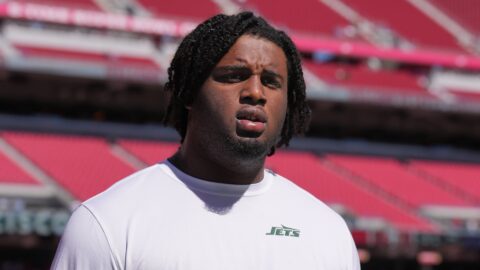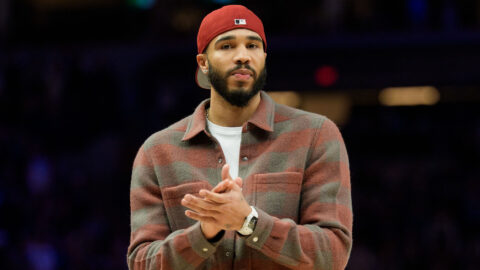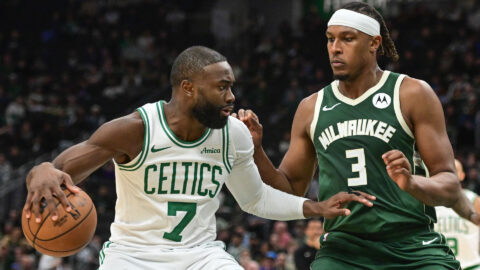BOSTON — It was less than two hours until tipoff in a pivotal inter-division showdown with the Hawks, and Rajon Rondo was not there to make friends.
The Celtics point guard swayed idly in a chair in the center of the locker room, intently watching video of that night’s opponent on one of two large TV screens.
If anything about the midseason drama that surrounded Rondo or the Celtics still bothered him, he did not show it. Then again, a thrilled Rondo is often indistinguishable from an enraged Rondo, his expression blank, his words vacant of emotion or insight. A few hours later, after he had handed out 20 assists while recording his sixth triple-double of the season in an overtime victory, Rondo was characteristically understated.
“It’s just how it is,” he said. “You win some, you lose some.”
With Rondo at the helm, the Celtics have won a lot more than they have lost of late. They are 21-8 since the All-Star break, and Rondo’s streak of games with double-digit assists reached 22 games in Sunday’s win in Charlotte.
With each game, Rondo’s play seems to hit a higher level, yet he reacts to every performance with the zest of a tranquilized golf analyst.
“Coach ordered it. I was just trying to get it done,” Rondo said after scoring 10 points and handing out four assists — in the first quarter — against the Miami Heat on April 1.
“As long as guys play hard, that’s what it’s about,” he said when Ray Allen moved to the bench, with second-year guard Avery Bradley taking Allen’s place in the starting lineup.
A rejuvenated Kevin Garnett is a candidate for the Defensive Player of the Year award, Paul Pierce has rediscovered his shooting stroke after slogging through the first two months of the season and role players such as Brandon Bass, Bradley, Greg Stiemsma and Mickael Pietrus have delivered above and beyond the roles they were acquired to fill.
But it has been Rondo, producing much while saying little, who has powered a Celtics squad that has every other team nervous as the playoffs approach.
When the tape recorders and TV cameras are turned on, Rondo’s lips seldom come unsealed, and that is just fine with Garnett. Boston’s de facto center now that the Celtics frontcourt has been decimated by the season-ending health ailments of Jermaine O’Neal, Chris Wilcox and Jeff Green, Garnett has long endured criticism of his approach. Whereas Garnett is fiery and belligerent, Rondo is steely and defiant. In both cases, some people find their demeanors admirable while others find it grating.
“The same thing that makes you great, a lot of times, is the same thing that makes a lot of people hate you,” Garnett said.
That may be why acclaim is slower in coming for Rondo than for someone, like all-around nice guy Steve Nash or humble, self-effacing MVP Derrick Rose. Heat point guard Mario Chalmers was complimentary but far from effusive in praising Rondo prior to a meeting in early April, saying Rondo was good at “running the team” and crediting him for his ability to get the ball to “one of the greatest shooters in the game right now in Ray Allen,” even though at the time Allen had not played in more than a week.
Watching Rondo through the eyes of an opponent, his style can look somewhat arrogant. He dribbles the ball higher than most point guards, as if daring his defender to reach. He darts into the lane despite his 6-foot-1 size, often leaving himself without an out when the defense collapses.
Rondo’s critics had a field day with his midseason two-game suspension for tossing a ball at official Sean Wright in Detroit. Rondo missed the final two games before the All-Star break, which the Celtics entered with an underwhelming 15-17 record and talk of whether it was time to break up the Hall of Fame trio of Garnett, Allen and Paul Pierce. Rondo’s name soon surfaced as trade bait.
If any team had come to the Celtics with a trade proposal that would have made the Celtics better, the team would have taken it, a fact that was reiterated by team president of basketball operations Danny Ainge on a weekly radio appearance last week. Reports suggested that teams were bidding low on Rondo, betting that the Celtics’ locker room atmosphere was so toxic that Ainge would deal away his point guard for pennies on the dollar. Even a vocal segment of Celtics fans advocated on social media to cut ties with the enigmatic young All-Star.
Bass was not among them. The 26-year-old forward, who came to Boston in the preseason trade that sent Glen Davis to the Orlando Magic, is on pace to post the highest scoring average of his career. The sixth-year pro deserves the bulk of the credit for that improvement, of course, as his numbers per 36 minutes have always bode well if he ever received starter’s minutes. It is no coincidence that his improvement has occurred while he is receiving more minutes than at any time in his career, and that Celtics coach Doc Rivers even calls plays for him. Bass seldom enjoyed such a luxury in his previous stops in New Orleans, Dallas or Orlando.
Yet Bass quickly admits that Rondo’s ability to create easy shots for him has helped him ease into a new system with the Celtics.
“He’s a point guard, man,” Bass said, emphasizing “point guard” a second time. “That’s what he does,” Bass said. “He told me that’s what he gets paid to do, be a point guard. He’s been playing well, and I’m happy I’m on his side.”
The Celtics share the ball better than any team in the NBA, with 23.6 percent of their possessions ending in an assist. Pierce and Garnett both sit among the top five in assists per game at their positions. So Rondo is not the only player with a knack for finding the open man — but it does start with him.
“Rondo really sets the tone in that department,” Pierce said. “When you come off screens, he gets the quick passes, finding open guys. After a while, it really gets contagious. Guys start finding one another. Nobody cares who gets the shots. When you hit the open man, that’s pretty much Celtic basketball when you sum it all up: taking a good shot and turning it into a great shot.”
Maybe the midseason trade talk is forgotten by Rondo. Or maybe, given Ainge’s comments, it is still a source of motivation for the ever-improving guard. After all, Rondo’s career began with a trade, when he was sent from Phoenix to Boston on draft day in 2006. He got early exposure to being coveted by one team while another team decided it could do without him.
“He got beat up a little bit during the trade talks and all that, and as a big brother I just tell him we’ve been through that,” Garnett said. “I just keep telling him positive stuff. When you go through tough times, you really see who’s with you. At the same time, he’s been picking up where others have been slacking.”
In less than two weeks, the Celtics will begin their fifth playoff run with Rondo running the point. Little is known for sure about their postseason status — what team they will play, whether they will have home-court advantage, how Allen’s right ankle will behave, whether the veteran Celtics can maintain their current intensity in a long series.
What is certain is that whoever the Celtics play, wherever they play, however they play, Rondo will not be one for conversation. Some may hate it, but it is part of what makes him great.
Have a question for Ben Watanabe? Send it to him via Twitter at @BenjeeBallgame or send it here.



